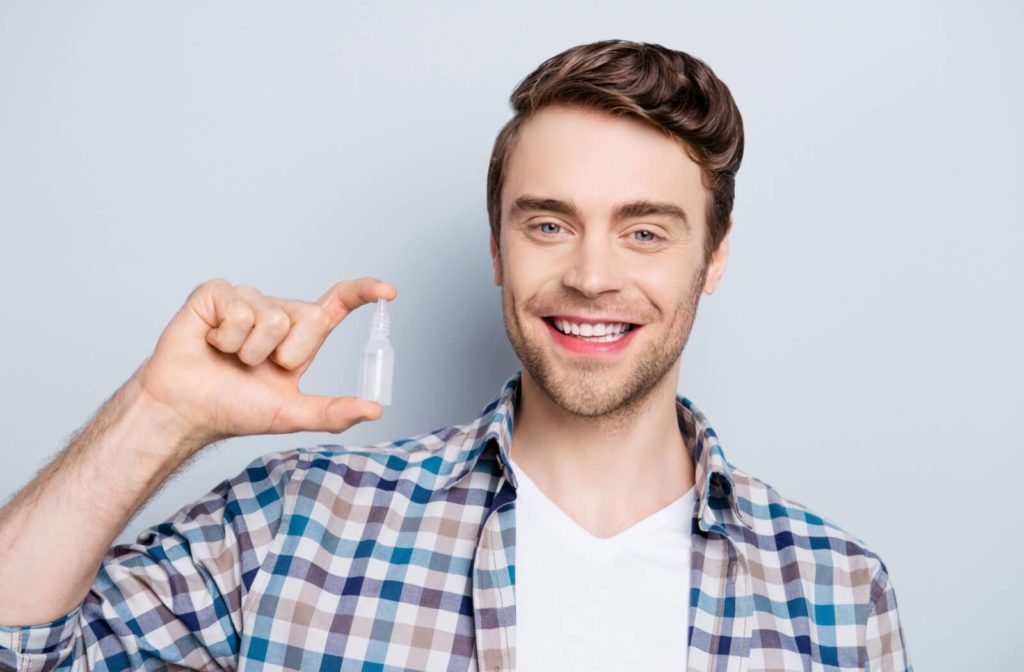Staying on top of your ocular health includes monitoring what you’re applying to or around your eyes. Like medication, makeup, or skincare, using expired products, like eye drops, can negatively impact our health and well-being.
No matter the type, all eye drops expire. Accidentally using expired drops once won’t necessarily cause harm, but continuing to use expired drops can increase the risk of serious concerns.
Expired drops are less effective for managing and treating eye conditions and increase the potential for bacterial growth.
All About Eye Drops
Eye drops are specially formulated solutions that moisturize, lubricate, or deliver medications directly to the eyes. They are used to alleviate a range of conditions while supporting eye health and comfort.
When applied, eye drops spread across the eye’s surface, allowing the active ingredients to interact with ocular tissues. This direct application lets the treatment quickly take effect.
Eye drops aren’t a one-size-fits-all answer to discomfort. They come in different formulations to target and manage varying eye concerns:
- Artificial tears: These are the most popular type of eye drops because of their versatility. They mimic the natural composition of tears to moisturize the eyes, offering relief from dryness, eye strain, and irritation. They can be used throughout the day or as needed, and are available in two options; preservative-free or with preservatives.
- Medicated eye drops: These prescription eye drops deliver medication to treat specific eye concerns like bacterial infections like conjunctivitis or glaucoma. It’s important to follow dosage instructions carefully.
- Anti-allergy eye drops: These reduce symptoms associated with allergies like watery eyes and redness and can be used before exposure to allergens for prevention or when symptoms arise.
Using the right eye drops for your specific eye concern is key for effective relief and management. The wrong drops may fail to alleviate your symptoms and can cause the condition to worsen because of incorrect management.
If you’re unsure which eye drop will help target the underlying cause of eye irritation, consult your optometrist. They’ll determine the most appropriate solution by evaluating your symptoms and accurately diagnosing the concern.
Why Do Eye Drops Expire?
Eye drops, like many products, have a limited shelf life and do expire.
The primary reason they expire is because the active ingredients in the solution degrade over time, reducing their effectiveness, and compromising their ability to to provide relief. This can be particularly troublesome if you rely on medicated drops to treat infections or manage conditions like glaucoma.
Once a bottle of drops is opened, it becomes more susceptible to contamination from bacteria and other microorganisms, with this risk increasing with time.
Chemical preservatives in some drops may slow down this process but eventually, even they lose their efficacy, which can result in microbial growth, increasing the risk of eye infections.
The expiration of eye drops after opening largely deepens on the type of formulation:
- Preservative-free artificial tears: These should be used immediately after opening, as they are intended for single-use application to prevent contamination. If offered in multiple-dose vials, they should be used within a day or as specified by the manufacturer.
- Artificial tears with preservatives: Preservatives allow for a longer shelf life, ranging from a few weeks to three months. This will vary depending on the brand, be sure to follow the manufacturing instructions.
- Medicated eye drops: These generally have a stringent expiration of around 28 days after opening. It’s very important to adhere to this schedule to reap the benefits of the ocular concern it’s meant to target.
- Anti-allergy eye drops: Similar to medicated drops, these generally expire around one month after opening. Always refer to the packaging for specific guidelines.
Always check the expiry date to minimize the risk associated with expired eye drops. This information is typically located on the box packaging or directly on the bottle.
Look for the expiration date printed on the label, which might be marked as “EXP” followed by the month and year. If any instructions come with the packaging, they may also provide guidelines on how long the drops remain effective after opening.
If you’re unsure whether the date has passed, you can check for signs of spoilage like changes in color, consistency, or odor, but, it’s better to dispose of the bottle and purchase new drops.
If you do accidentally use expired drops, don’t panic. Using them once doesn’t constitute an eye emergency. But, monitor for signs of infection like redness or irritation, and visit your optometrist right away if you notice any issues.
Caring for Your Eye Drops
Once the drops are opened, they can become a breeding ground for bacteria, especially if the bottle hasn’t been properly stored. Following proper care and storage won’t prolong the drop’s shelf-life but help maintain its efficacy.
- Temperature: Store eye drops in a cool, dry place away from direct sunlight and heat, which can accelerate its degradation process. Some drops may require refrigeration, so always check the label or packaging for specific temperature requirements.
- Seal integrity: Make sure the bottle cap is tightly closed after each use to prevent air and moisture from contaminating the solution.
- Cleanliness: Always wash your hands thoroughly before handling your eye drop bottle to reduce the risk of introducing bacteria.
- Avoid contact: Don’t let the dropper tip touch any surfaces, including your eyes or hands, as this can lead to contamination.
- Use before expiry: Adhere to the expiration date and discard any unused drops past this date, especially for preservative-free formulations which can quickly attract microbial after opening.
Following these guidelines helps preserve the quality and efficacy of your eye drops so they continue to relieve or treat eye conditions throughout their intended period of use.
Schedule a Visit
Eye drops can help manage and relieve symptoms of eye irritation and discomfort, but visiting your eye doctor helps determine its underlying cause.
Connect with our team at Headwaters Optometry to schedule a visit.




